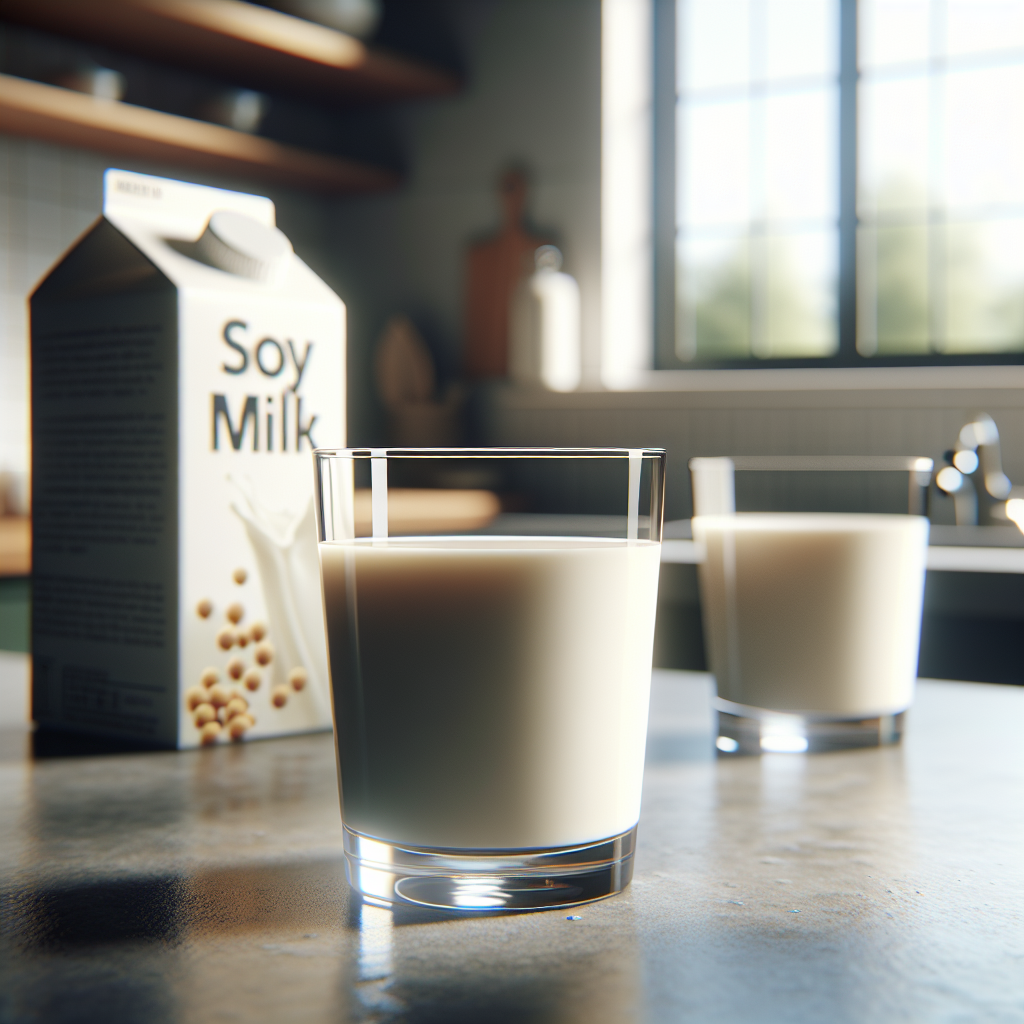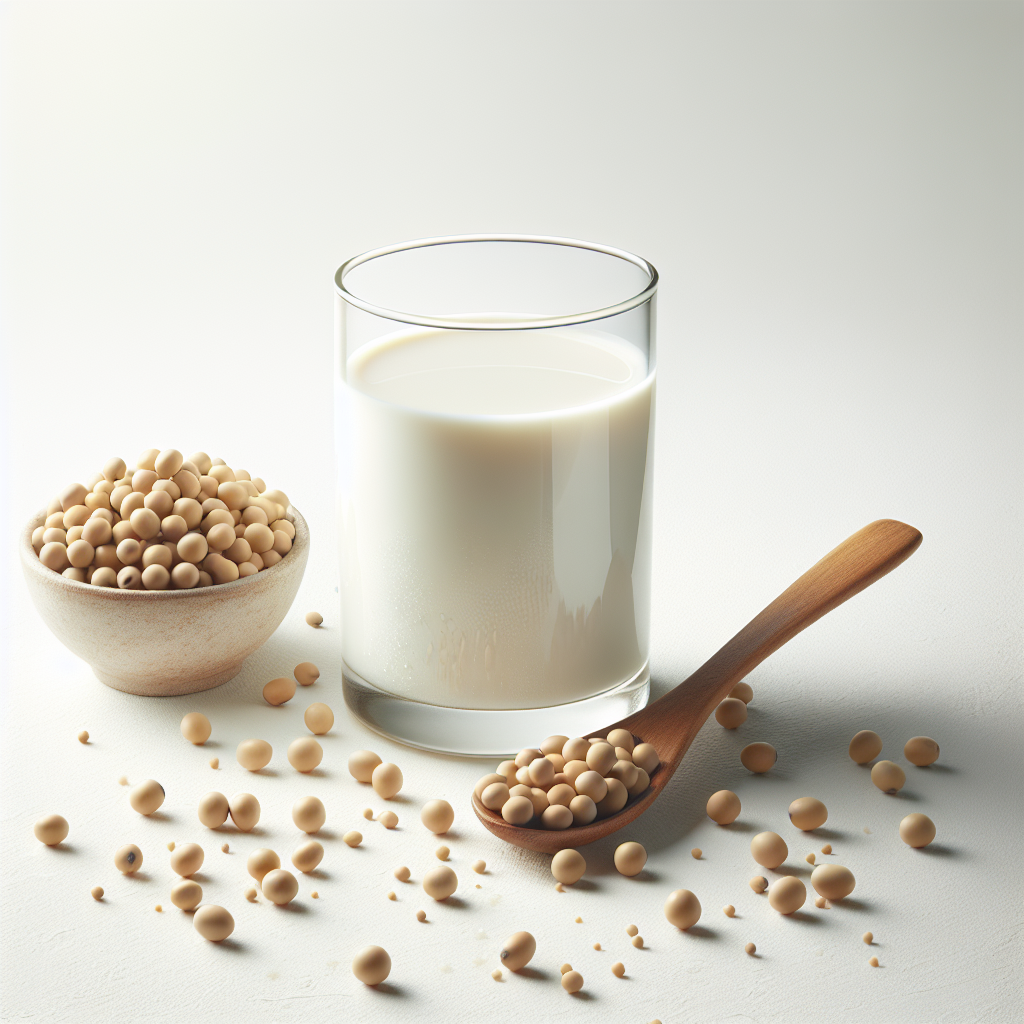Soy milk has emerged as one of the most popular dairy alternatives, and for good reason. Derived from whole soybeans or soy protein isolate, soy milk is rich in protein, vitamins, and minerals. It provides a creamy texture and a mild flavor that makes it a versatile ingredient in various recipes. But what truly sets soy milk apart from other dairy alternatives?
First and foremost, soy milk is highly nutritious. It is packed with essential nutrients like calcium, vitamin D, and vitamin B12, which are crucial for maintaining healthy bones and immune function. Additionally, soy milk contains a significant amount of protein, comparable to that found in cow's milk, making it an excellent choice for those looking to boost their protein intake without consuming animal products.
Another compelling benefit is its eco-friendliness. Producing soy milk has a lower environmental impact compared to traditional cow's milk. It requires less water and generates fewer greenhouse gases, making it a more sustainable option for eco-conscious consumers.
Moreover, soy milk is lactose-free, making it suitable for lactose-intolerant individuals who are unable to digest lactose found in cow's milk. This makes soy milk a go-to option for anyone looking to avoid digestive discomfort while still enjoying a nutritious beverage.
With its blend of health benefits, environmental advantages, and dietary suitability, soy milk stands out as an exceptional dairy alternative. Ready to experience these benefits for yourself? Get yours today!
Nutritional Advantages of Soy Milk

Soy milk is not just a tasty alternative to dairy milk; it is also packed with a plethora of nutritional benefits that make it a strong contender in the world of plant-based beverages. One of the most notable advantages of soy milk is its high protein content. Each cup of soy milk provides about 7 grams of protein, which is comparable to the protein content found in cow's milk. This makes soy milk an excellent choice for vegetarians, vegans, and those looking to reduce their meat consumption without sacrificing protein intake.
In addition to protein, soy milk is fortified with essential vitamins and minerals. It is often enriched with calcium and vitamin D, both of which are crucial for maintaining strong bones and teeth. Many brands also add vitamin B12, making it easier for those on a plant-based diet to meet their nutritional needs.
Soy milk is also rich in isoflavones, which are plant compounds that have been shown to have antioxidant properties. These isoflavones can help reduce inflammation in the body and may even lower the risk of certain chronic diseases, such as heart disease and cancer.
Another nutritional advantage of soy milk is its low saturated fat content. Unlike cow's milk, which contains higher levels of saturated fats, soy milk contains heart-healthy unsaturated fats. This makes it a better option for those looking to maintain cardiovascular health.
Finally, soy milk is naturally cholesterol-free, which is beneficial for those monitoring their cholesterol levels. By incorporating soy milk into your diet, you can enjoy a delicious and nutritious beverage that supports overall health and well-being.
Health Benefits of Soy Milk

Soy milk offers a multitude of health benefits that make it an excellent choice for those seeking a nutritious and wholesome dairy alternative. One of the primary health advantages of soy milk is its ability to support heart health. Soy milk contains unsaturated fats, which can help reduce bad cholesterol levels (LDL) while increasing good cholesterol (HDL). This balance is essential for maintaining a healthy cardiovascular system and reducing the risk of heart disease and stroke.
Another significant benefit of soy milk is its potential to aid in weight management. With fewer calories and fats compared to cow's milk, soy milk can be a valuable addition to a weight loss or weight maintenance diet. Additionally, the high protein content in soy milk helps promote satiety, making you feel fuller for longer and reducing the likelihood of overeating.
Soy milk is also rich in isoflavones, which have been linked to various health benefits including the potential to reduce menopausal symptoms. These plant compounds mimic estrogen in the body and can help alleviate hot flashes, night sweats, and other symptoms associated with menopause.
The antioxidants found in soy milk play a crucial role in combating oxidative stress and inflammation. By neutralizing free radicals, these antioxidants can help prevent cellular damage and reduce the risk of chronic diseases such as cancer and diabetes.
For those with lactose intolerance or dairy allergies, soy milk is a fantastic alternative that can provide similar nutritional benefits without the adverse effects. Being naturally lactose-free, soy milk is easier to digest for individuals who have difficulty processing lactose.
Incorporating soy milk into your daily diet can also contribute to better bone health. Fortified soy milk often contains added calcium and vitamin D, essential nutrients for maintaining strong bones and preventing osteoporosis.
Overall, soy milk is a versatile and health-boosting beverage that can enhance your overall well-being. By choosing soy milk, you not only enjoy a delicious drink but also reap the numerous health benefits it offers.
Soy Milk Environmental Impact

The environmental impact of soy milk is significantly more favorable compared to traditional dairy milk. One of the most compelling reasons to switch to soy milk is its lower carbon footprint. Producing soy milk requires considerably less energy and generates fewer greenhouse gas emissions than dairy farming. This makes soy milk an environmentally conscious choice for those looking to reduce their carbon footprint.
Water usage is another critical factor where soy milk outshines dairy milk. The production of soy milk demands much less water. To put it into perspective, producing a liter of cow's milk requires about 1,000 liters of water, while soy milk production uses only a fraction of that amount. This substantial difference highlights soy milk as a more sustainable option, especially in regions facing water scarcity.
Furthermore, soy milk contributes to lower land usage. Dairy farming not only requires vast expanses of land for grazing but also for growing feed crops. In contrast, soybeans can be cultivated more efficiently, requiring less land and offering higher yields per hectare. This efficient land use helps preserve natural habitats and biodiversity, which are often threatened by extensive dairy farming practices.
Another environmental benefit of soy milk is the reduction in deforestation. While some soybeans are grown on deforested land, a significant portion is cultivated on existing agricultural land. Moreover, as awareness and demand for sustainably sourced soybeans grow, more farmers are adopting responsible and eco-friendly farming practices.
Soy milk production also generates less agricultural runoff and pollution. The fertilizers and pesticides used in dairy farming can contaminate water bodies and soil, causing long-term environmental damage. Soybean cultivation, on the other hand, tends to involve fewer chemicals, reducing the risk of environmental contamination.
Overall, the environmental impact of soy milk is considerably less detrimental than that of dairy milk. By choosing soy milk, you are making a more sustainable and eco-friendly choice that helps protect our planet.
Versatility of Soy Milk in Cooking
Soy milk is celebrated not just for its health benefits and eco-friendliness, but also for its remarkable versatility in the kitchen. Whether you're a professional chef or a home cook, soy milk can be seamlessly integrated into a variety of recipes, making it an indispensable ingredient for those seeking dairy alternatives.
One of the primary advantages of soy milk is its ability to mimic the consistency and texture of cow's milk. This makes it an excellent substitute in baking. From cakes and muffins to pancakes and bread, soy milk delivers the same moisture and richness, ensuring your baked goods turn out just as delicious and fluffy.
Soy milk's versatility extends to savory dishes as well. It can be used to create creamy sauces, soups, and gravies without compromising on flavor or texture. For example, you can make a rich béchamel sauce or a hearty potato soup using soy milk, achieving the same smooth and creamy consistency as you would with dairy milk.
In addition, soy milk works wonderfully in beverages. It can be used to make frothy lattes, smoothies, and milkshakes. The mild and slightly sweet flavor of soy milk pairs well with coffee and various fruits, enhancing the taste of your favorite drinks.
For those who enjoy experimenting in the kitchen, soy milk offers endless possibilities. You can infuse it with flavors like vanilla, chocolate, or even spices to create unique and delicious variations. Soy milk can also be used to make homemade yogurt and ice cream, allowing you to enjoy dairy-free versions of these popular treats.
Moreover, soy milk is an excellent choice for those with dietary restrictions. It is naturally lactose-free, making it suitable for individuals with lactose intolerance. It's also a great option for vegans and vegetarians, offering a plant-based alternative that is rich in protein and nutrients.
In summary, the versatility of soy milk in cooking makes it a fantastic addition to any kitchen. Its ability to adapt to both sweet and savory recipes, along with its compatibility with various dietary needs, ensures that soy milk can enhance your culinary creations in countless ways.
Cost Savings with Homemade Soy Milk

One of the most compelling reasons to switch to homemade soy milk is the significant cost savings. Store-bought soy milk can be pricey, especially when compared to the cost of the raw ingredients needed to make it at home. With the right tools, like the revolutionary milk making blender from MilkDepot.com, you can cut down your expenses by up to 90%.
The primary ingredient for making soy milk is soybeans, which are incredibly affordable. A small quantity of soybeans can produce a substantial amount of soy milk, making it a more cost-effective option in the long run. Additionally, by making soy milk at home, you have complete control over the quality of the ingredients, ensuring that your milk is free from additives, preservatives, and any unwanted chemicals.
Beyond the cost of ingredients, making your own soy milk can also reduce waste. Store-bought soy milk typically comes in cartons or plastic bottles, which contribute to environmental waste. By making soy milk at home, you can use reusable containers, significantly reducing your ecological footprint.
Moreover, the versatility of homemade soy milk means you can create a variety of flavors and types without the added cost of buying multiple products. Whether you prefer plain, vanilla, or chocolate soy milk, you can easily customize your homemade version to suit your taste preferences. This not only saves money but also provides a healthier alternative to store-bought flavored milks, which often contain added sugars and artificial flavors.
Investing in a high-quality blender, like the one offered by MilkDepot.ca, is essential for achieving the best results. Our blender features a powerful motor and high-quality stainless steel components, ensuring that you can make fresh, filtered soy milk in less than 60 seconds. It's a one-time investment that pays off quickly, given the substantial savings on store-bought milk.
Ready to start saving money and enjoy fresh, homemade soy milk? Get yours today! and discover the benefits of homemade soy milk for yourself.
